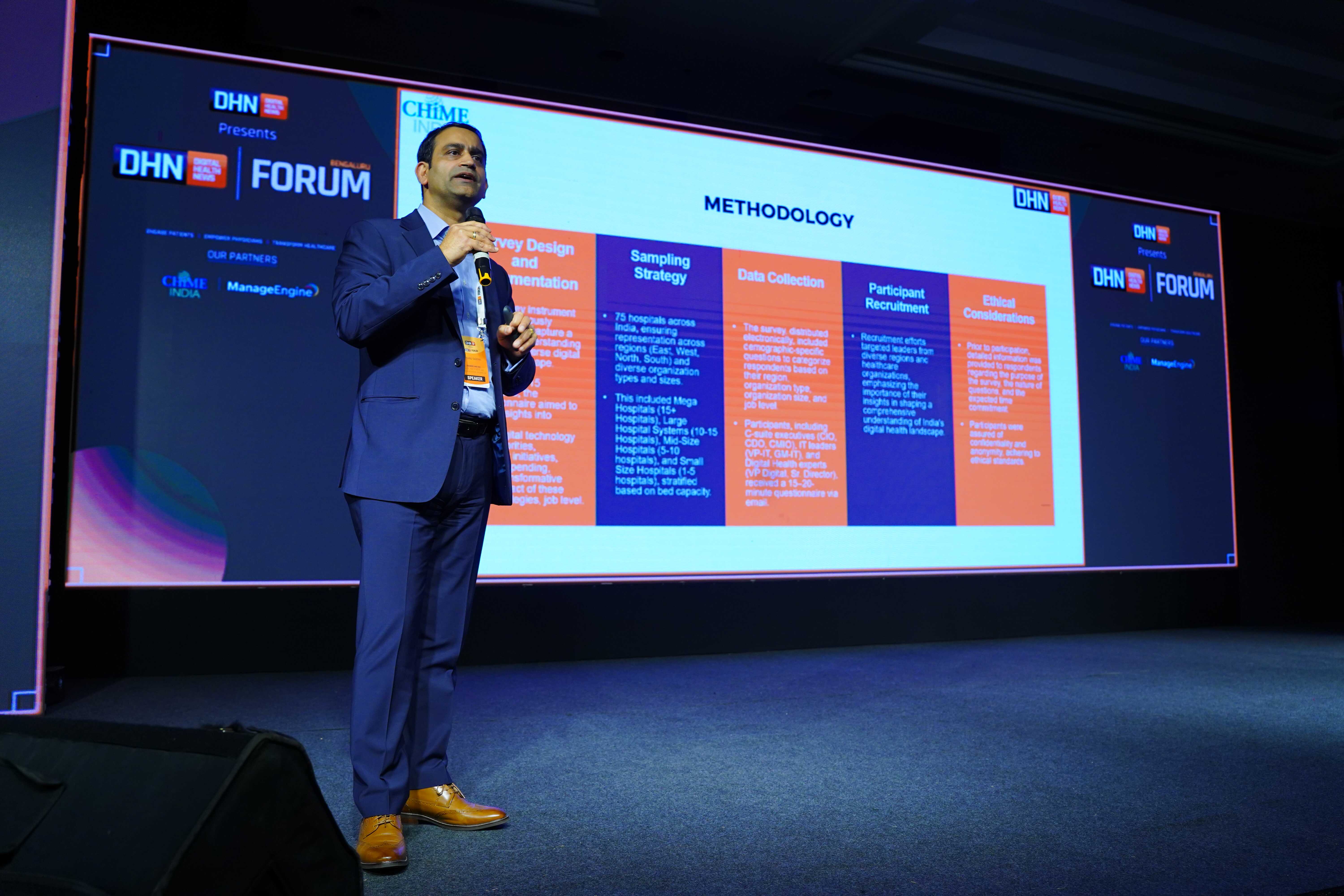Written by : Varsha Sharma
February 29, 2024

At the conference, DHN & CHIME India Annual Survey results were unveiled, shedding light on digital health trends and outlook for 2024.
Intro: DHN Forum Bengaluru, a thought leadership day-long conference organized by Digital Health News (DHN), aimed at reshaping India's Digital healthcare horizon. This meticulously curated event wasn't just about discussions; rather it served as a platform to catalyst digital transformation. With a sharp focus on tech adoption, infrastructure & capability building, it ignited a revolutionary spark, discussing healthcare innovation.
Esteemed healthcare leaders from India and the US, including Arvind Sivaramakrishnan, CIO of Karkinos Healthcare; Vishnu Saxena, founder & CEO of DHN & ScaleHealthTech; Feby Abraham, EVP, chief strategy & innovations officer and Neal Patel, CIO of Vanderbilt University Medical Center, Nashville, TN; Kumar KV, CIO of Narayana Health; Ashokkan Somuveerappan, CIO of Apollo Hospitals, led engaging discussions and panel sessions.
They addressed key topics such as: consumer-driven health, healthcare data unlocking, and bridging the digital divide, cyber security, stimulating thought provoking dialogue among key stakeholders.
The conference commenced with Vishnu Saxena, founder & CEO of DHN, sharing the inspiration behind DHN and its series of conferences, including DHN Forum Bengaluru, Mumbai, Delhi, Kolkata, and more.
Saxena emphasized the importance of leveraging insights from the US healthcare industry to drive innovation in India. He said, "I aspired to establish a trusted platform for Healthtech, news, policies, innovations, and more. Expanding beyond the dissemination of news was essential because our aim was not solely to convey information; rather, we aspired to instigate significant change.”
He conceived DHN Forum as one for top hospital executives to exchange unique insights that sculpt the trajectory of digital healthcare in India. Stressing the importance of regional empowerment, he affirmed, "Innovation without adoption is not transformation."
Additionally, he announced the launch of the DHN mobile app for iOS and Android, marking a significant step in advancing digital healthcare accessibility and collaboration nationwide.
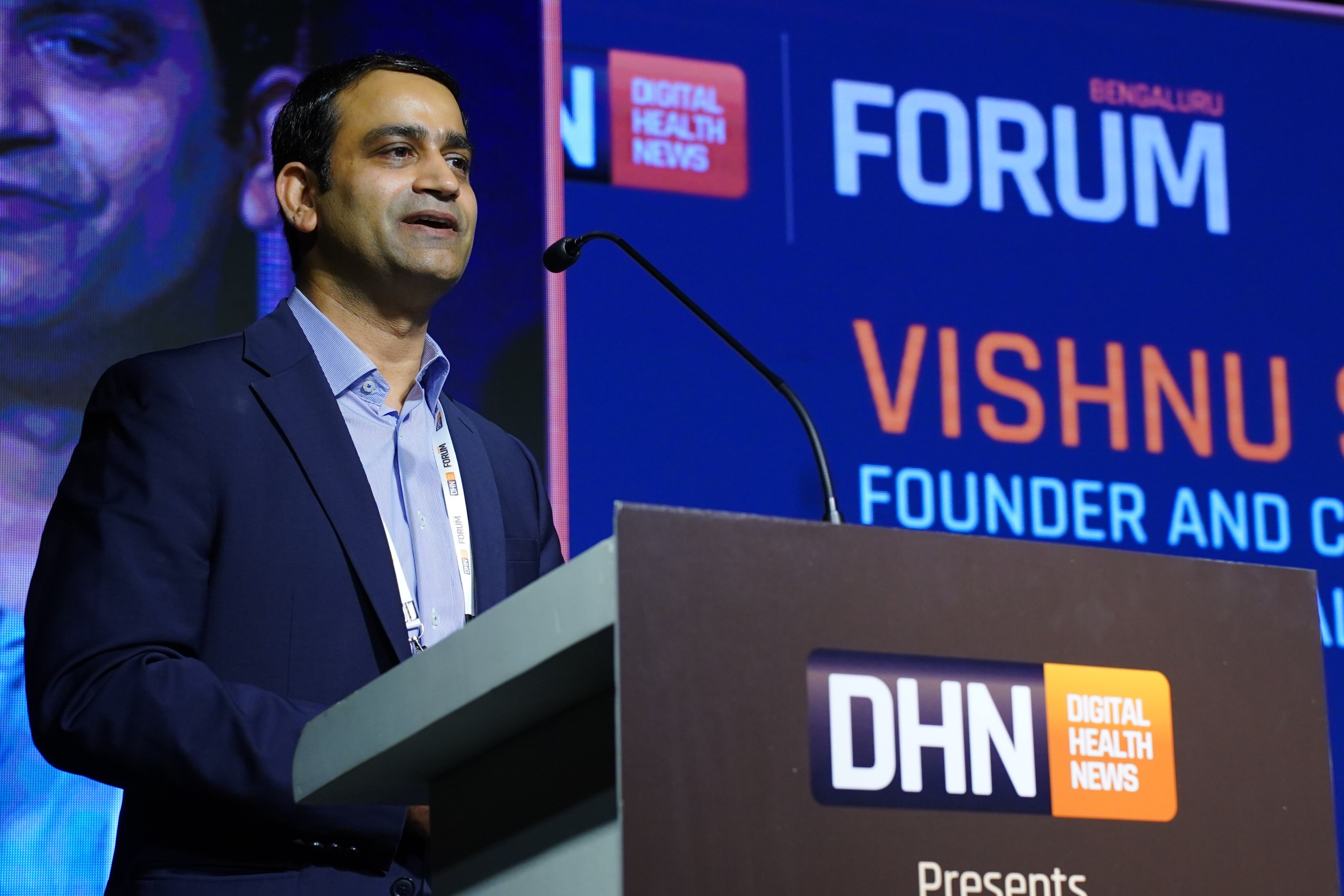
Vishnu Saxena, DHN Founder & CEO speaks at DHN Forum Bengaluru
Speaking at the conference, D Randeep, IAS, Commissioner of Health & Family Welfare Services, Government of Karnataka, shared a few key initiatives that the Karnataka Government has launched to improve healthcare delivery.
He said, "In the realm of digital healthcare, innovation stands as a cornerstone for our collective well-being,".
Reflecting on the government's strides in health digitization, he emphasized the seamless integration of digital processes across various domains such as file records, attendance, and reporting, aimed at optimizing resource allocation and strategic planning.
Randeep outlined collaborative initiatives between the government and private sector, particularly in implementing the hub-spoke model, which extends essential last-mile health services encompassing mental health, neurology, ICU monitoring, and cardiac support.
Additionally, he unveiled Karnataka government's ambitious plan to launch a cutting-edge microsite designed to engage private stakeholders in the Ayushman Bharat Digital Mission (ABDM), emphasizing the mission's pivotal role in establishing a robust digital ecosystem within the government managed healthcare ecosystem.
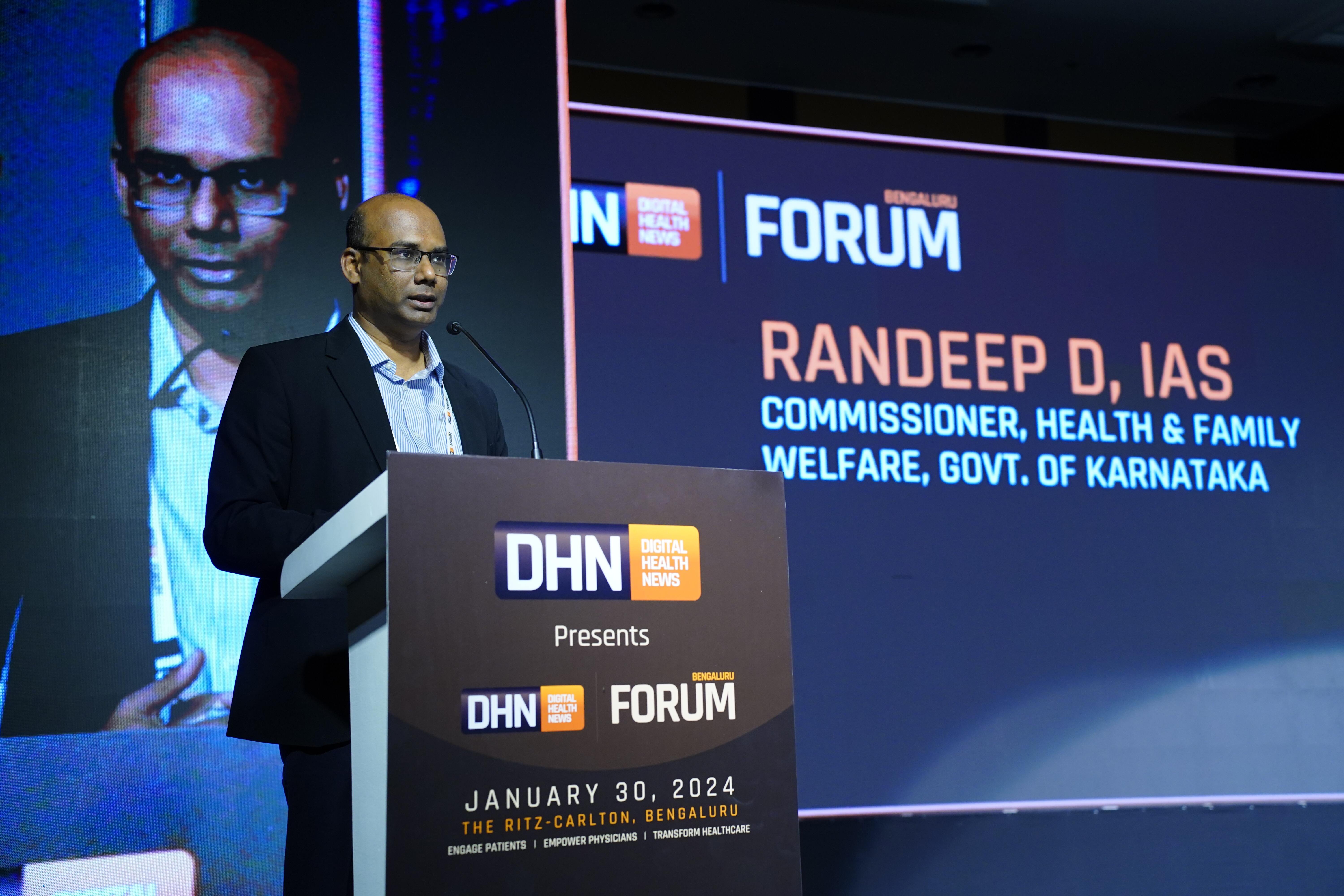
D Randeep, IAS, Commissioner of Health & Family Welfare Services, Government of Karnataka speaks at DHN Forum Bengaluru
Dr Ganapathy Krishnan, director of Apollo Telemedicine Networking Foundation and Apollo Telehealth Services, delivered insights on, "Digital Health in 2030: A Peep into The Future." In his speech, he anticipated a significant transformation in hospitals by 2030, shifting towards specialized centers focused on surgeries and procedures. Krishnan outlined five prospective trends:
1. Personalized, Participatory, and Preventive Healthcare: He emphasized a shift towards tailored healthcare delivery.
2. Hospitals Redefined: Hospitals will transition to specialized centers primarily for procedures.
3. Mobile Healthcare: Mobile MRIs will become commonplace, making healthcare more accessible.
4. Technological Advancements: India aims to offer a 5G standard of care by 2035, with efforts towards 6G development.
5. Corporate Focus on Preventive Healthcare: Corporate hospitals are shifting towards preventive healthcare, driven by a commercial imperative.
Krishnan predicted substantial investments in healthcare, projecting $217 billion and the creation of 12 million jobs by 2030. He reinforced, "Make in India for the World," indicating India's potential to become a global hub for healthcare solutions and services.
Additionally, Krishnan highlighted the evolving dynamics of healthcare, emphasizing technology's role in addressing individual needs and empowering patients.
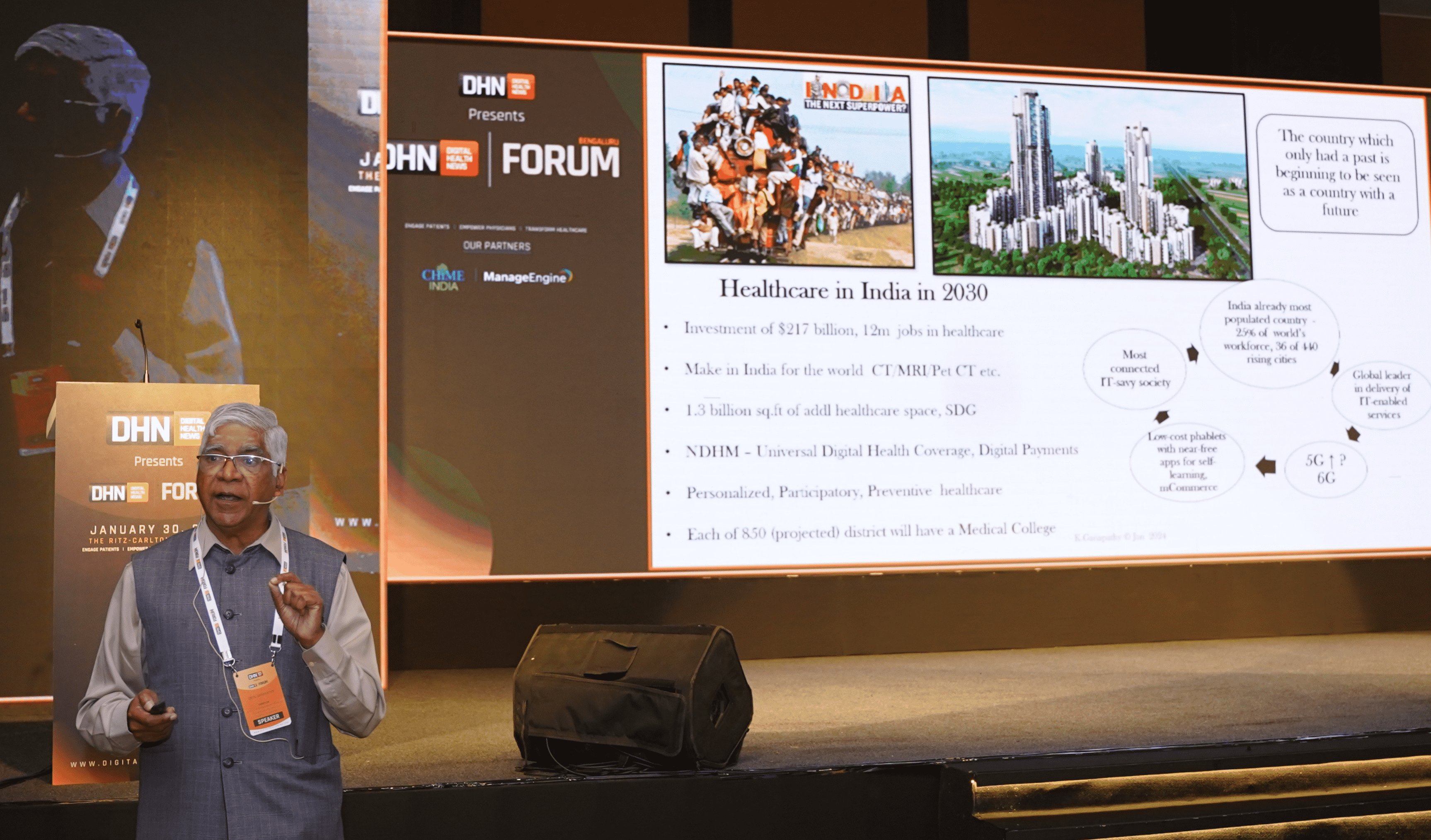
Dr Ganapathy Krishnan, director of Apollo Telemedicine Networking Foundation & Apollo Telehealth Services speaks at DHN Forum Bengaluru
The session, moderated by Vishnu Saxena, moderated a fireside chat comprising prominent industry figures including Feby Abraham, ; Arvind Sivaramakrishnan, ; Ashokkan Somuveerappan, ; and Kumar KV.
Sivaramakrishnan emphasized India's rapid technology adaptation during the COVID-19 pandemic. He said, "At the start of the COVID pandemic, we had to face a lot of problems due to lack of healthcare facilities, but then we were fast to learn and execute at scale and capacity without compromising clinical quality and patient safety."
"Cost is a major hurdle in the path of digital transformation. We are now at a stage where we are struggling to get the SOP right for digital transformation in India,” Sivaramakrishnan remarked.
Feby Abraham shared perspectives from the US healthcare system, noting challenges related to equitable access. He stated, "Equitable access is a big issue. US healthcare functions effectively for individuals with insurance but poses significant challenges for those without insurance or residing in rural areas."
Abraham expressed interest in incorporating India's upfront treatment approach into the US system, noting its potential to save costs and improve access.
"I wish to incorporate this aspect of Indian healthcare into the US system, dedicating time and resources, ultimately saving costs,” he said.
The session emphasized the need for innovative approaches to address challenges and capitalize on opportunities in digital health transformation, drawing insights from both Indian and US healthcare landscapes.
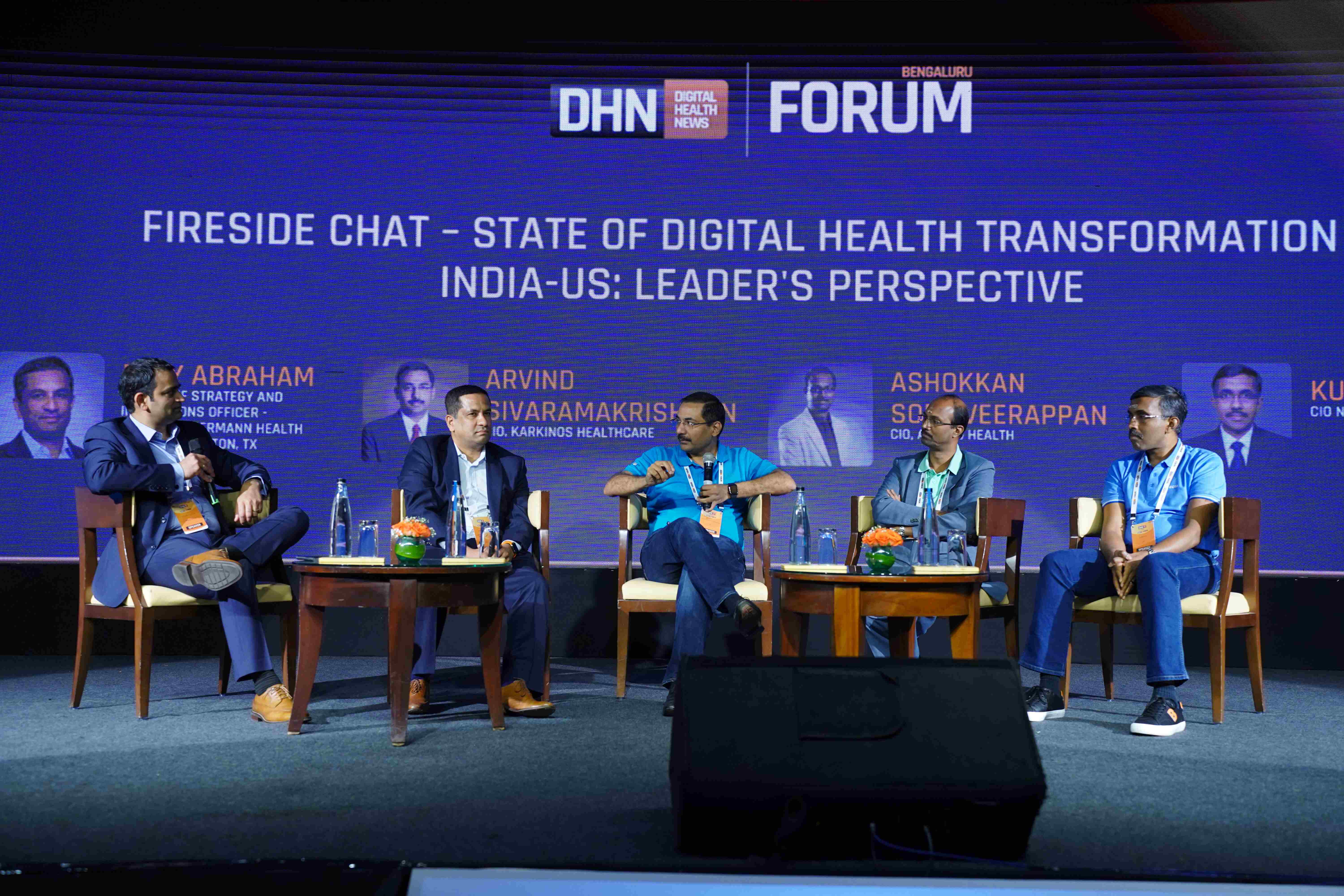
Fireside Chat: State of Digital Health Transformation Globally
In the panel discussion titled "Enabling Digital Transformation Mindset for New Age Hospitals," esteemed industry figures provided profound insights into the evolving landscape of healthcare and the essential shift towards embracing digital technologies.
The panelists, featuring Neal Patel, Dr Thanga Prabhu, CMIO of Apollo Hospitals; Sudeep Dey, CIO of HCG Hospitals Bangalore; and Sreeni Venugopal, CIO & CISO of Aster DM Healthcare, India, engaged in an insightful discussion under the expert moderation of Venkat Inumella, partner at McKinsey & Company.
Dr Prabhu emphasized the urgency of digital transformation in healthcare, stating unequivocally, "Going digital is not an option; it's a necessity." He stressed the need for technology to support clinicians in their daily workflows, emphasizing, "We will achieve the right transformation only when we prioritize the improvement of patient care."
Dey drew attention to the paramount importance of data security in the digital healthcare landscape, cautioning, "A single data breach incident can disrupt operations significantly and erode patient trust."
Patel delved into the challenges faced by clinicians in the United States, explaining, "Clinicians are experiencing burnout due to the overwhelming demands of technology systems that are not designed with their needs in mind."
"In India, patient data is often shared directly with patients to foster transparency and empowerment, whereas in the US, it tends to remain within the hospital's confines,” Patel stated.
Key insights from the discussion underscored the necessity for technology to benefit both patients and clinicians. Dr Thanga Prabhu reiterated, "Digitalization should aim to streamline clinicians' workflows and improve efficiency," while Patel emphasized India's unique opportunity for patient data democratization to enhance the overall healthcare ecosystem.
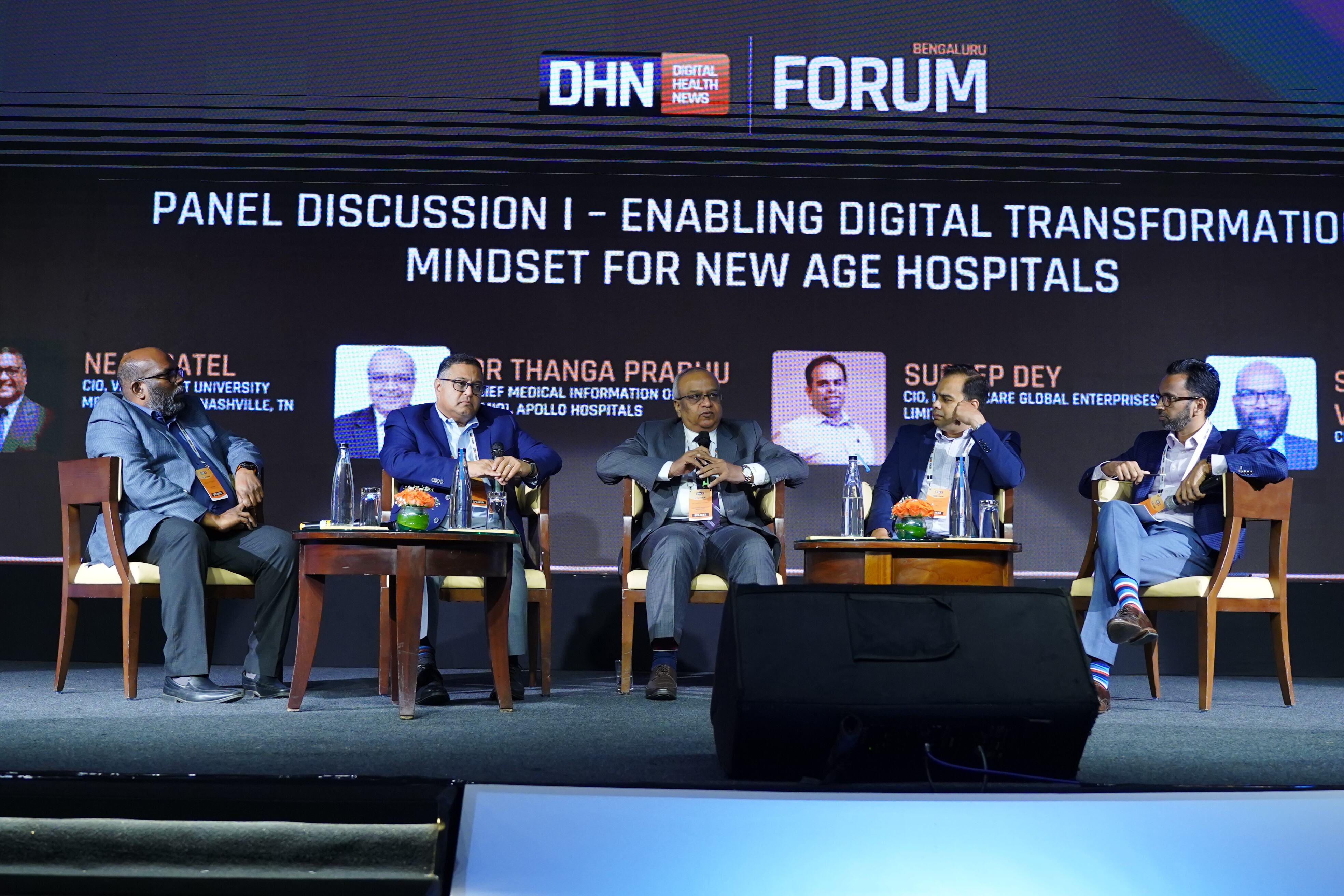
Panel Discussion I: Enabling Digital Transformation for Hospitals
This panel discussion focused on integrating AI in the Indian healthcare sector, industry experts including Geetha Manjunath, founder & CEO of Niramai Health Analytix; Praveen Bisht, CIO of Amrita Hospital and Shuvankar Parmanik, Dy CIO of Manipal Health shed light on challenges, and opportunities in leveraging AI technologies.
Praveen Bisht, emphasized the transformative potential of AI in healthcare delivery. He highlighted how AI, though not a novel concept, has gained traction due to its practical applications and adoptable use cases.
"We realized the significance of AI, especially with advancements like ChatGPT, which made AI accessible and powerful," Bist remarked.
He stressed on the importance of aligning AI initiatives with the existing digital ecosystem, ensuring seamless integration into clinical workflows.
Manjunath reflected on her experience harnessing AI to tackle critical healthcare issues, noting the evolution of AI technologies over the last twenty years.
"Advancements in computing power, algorithmic innovation, and data accessibility have propelled AI into the forefront of healthcare," she said.
Manjunath emphasized the importance of rigorous clinical validation and stakeholder collaboration in translating technology to deliver impactful healthcare interventions.
Sharing thoughts, Shuvankar Parmanik, underscored the ubiquitous application of AI across the patient lifecycle.
"From appointment booking to clinical diagnosis, AI has permeated every aspect of healthcare delivery," he noted.
Parmanik highlighted the need for seamless integration of AI into existing workflows to enhance operational efficiency and clinician adoption.
"Clinicians face challenges with varying EHR systems across different healthcare providers," Parmanik emphasized the importance of streamlining workflows to enhance adoption.
In conclusion, the panel agreed that a cohesive effort from the digital healthcare stakeholders in harnessing the power of AI is the need of the hour to achieve a positive outcome.
The discussion explored the transformative potential of digital technologies in reshaping patient experiences and revolutionizing healthcare delivery. Moderated by Girish Koppar, CIO, Wockhardt Hospital, Mumbai, the panel extensively explored the digital front door concept, its development, and profound influence on patient engagement and accessibility.
The panelists, including DHN founder, CEO Vishnu Saxena; Amit Sharma, CIO & Head of Partnerships & CSR at CyteCare Hospitals; Prem A, CDO, GM, NMC-Nodal Officer at St John’s Hospitals and Dr Nitiraj Gandhi, EVP, APAC, THB, shared insights on the topic.
Prem A, emphasized the imperative of enhancing accessibility, addressing unmet patient needs, optimizing costs, and streamlining pre and post-hospitalisation experience processes to ensure a seamless patient journey.
Additionally, he highlighted the utilization of QR code-based queue management systems to enhance patient convenience and efficiency.
“We started digital initiatives 2 years back and started implementation of the solution a year before. There’s a shift in patient behavior…so we’re trying to study the whole ecosystem to ensure the delivery of optimum patient experience,” said Prem A.
Amit Sharma, on the other hand, highlighted how new-age hospitals are integrating digital strategy from the inception itself. According to him, new-age hospitals have an advantage over legacy health systems in terms of defining processes. He went on to add that the majority of these processes are digital friendly and drafted keeping in mind the new-age digital savvy consumer.
Nitiraj Gandhi, reaffirmed the significance of empowering patients through digital platforms, enabling them to access vital information, schedule appointments, and make informed healthcare decisions.
According to Gandhi, the Digital Front Door initiative can be defined in terms of two major aspects: Access and Communication.
Vishnu Saxena emphasized the pivotal role of data-driven insights in designing personalized patient experiences. Drawing parallels with consumer-centric industries, he advocated for frictionless, omnichannel experiences across the patient journey, underpinned by robust data integration and analytics capabilities.
Saxena, who led Digital Front Door (DFD) initiatives at multiple hospitals in the US said during the COVID-19 pandemic, patient experience became the new battleground as a result of reduced patient volume.
Sharing his personal experience of working on the DFD initiative at NYP, he said,
"Today's experiences should be crafted with data driven insights. While having a hospital website is a good start, integrating a hospital app with siloed data sources is the key. This way, when a patient calls, the contact center agent can recognize them by their phone number and basic PHI information displayed to them in order to provide personalized assistance."
Amit Sharma highlighted the importance of collaborative partnerships and proactive risk management strategies to mitigate cybersecurity threats and ensure data integrity.
While Nitiraj Gandhi stressed the importance of ROI-driven decision-making and the need for robust business cases to justify digital investments. He advocated for early success and incremental gains to build momentum and garner leadership support for long-term digital transformation initiatives.
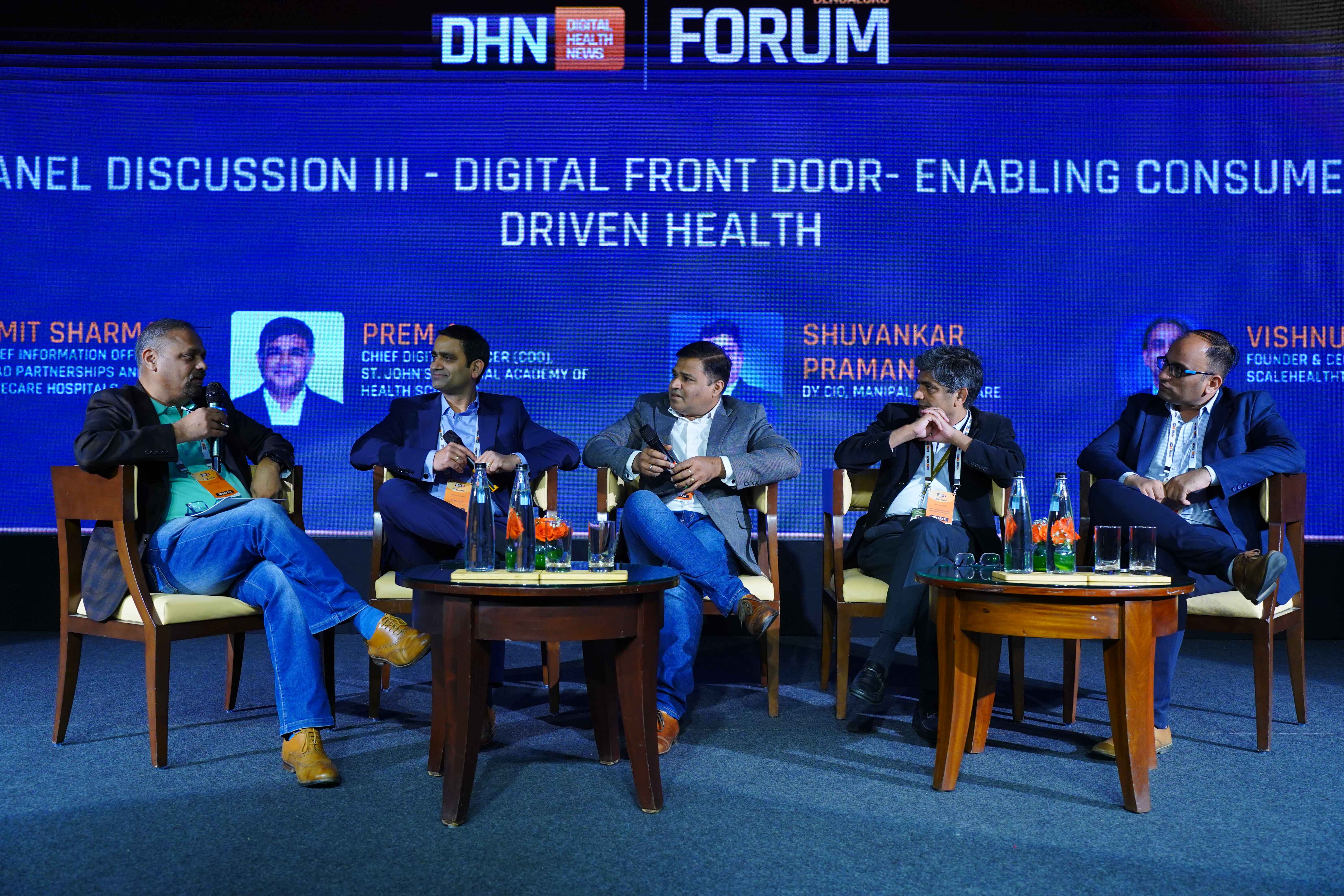
Panel Discussion III: Digital Front Door for Consumer-Driven Health
Romanus Prabhu, director, product support, ManageEngine, Zoho talked about the staggering costs associated with data breaches, citing IBM's report that the average cost of a data breach surged to $11 billion in 2023, a 53% increase from 2020.
Despite advancements in technology, vulnerabilities remain open and exploitable, with 78,000 vulnerabilities still lingering, albeit reduced to less than 10% from 2022.
Prabhu emphasized, "Threat actors can exploit these vulnerabilities, with 26% being exploitable yearly."
With a staggering statistic revealing that "3 in 1 Americans are affected due to data breaches," Prabhu noted the pervasive nature of this threat across industries and regions, saying “This is not a problem specific to one particular vertical or one particular region, it’s everywhere.’’
Thereafter, the Zoho director stressed the importance of adhering to essential fundamentals in managing network security. He cautioned that despite technological advancements, neglecting these fundamentals could pose significant challenges.
Adding to that, Prabhu outlined five basic assets that organizations seek to protect: people, endpoints, applications, infrastructure, and data.
Speaking about statistics, Prabhu reiterated that the majority of tools utilized in cyber-attacks, specifically 91%, are publicly accessible and free. He went on to highlight that threat actors leverage these tools extensively, employing only a small portion, approximately 9 to 10%, of their own code to safeguard or transmit data to the central command.
Prabhu urged organizations to adopt the NIST Cybersecurity Framework, emphasizing its five core functions: Identify, Protect, Detect, Respond, and Recover.
The insightful session concluded with a reminder that in today’s modern world, all organizations must understand that success in cybersecurity isn't solely dependent on possessing the appropriate tools, but rather on devising a strategic approach and utilizing those tools efficiently. As Prabhu aptly stated, "Not just tools, have a strategy.”
With proactive measures and strategic planning, organizations can navigate the complex cybersecurity landscape and safeguard their networks effectively.
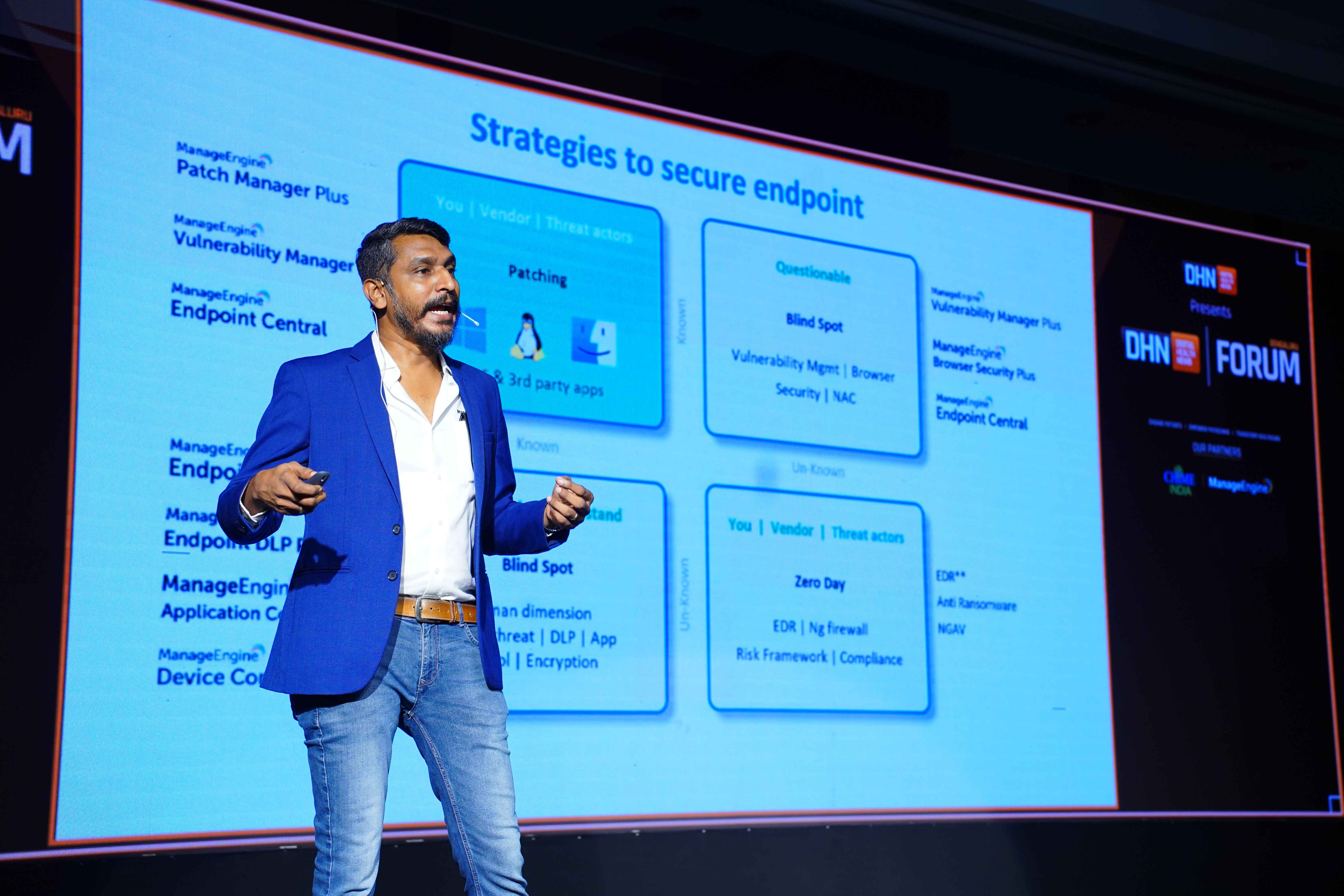
Romanus Prabhu, director, product support, ManageEngine, Zoho speaks at DHN Forum Bengaluru
Dr Nandkumar Jairam, chairman of Medica Synergie Hospitals and advisor at Sheares Healthcare India, shared profound insights on healthcare transformation. He emphasized the pivotal role of technology in revolutionizing healthcare.
“Technology is the most important tool available today. It has and will continue to transform healthcare in every aspect of its existence. It is a comprehensive, complete transformation that will result in efficiencies that will enable us to deliver care in a better way, in a more efficient manner and achieve cost reductions,’’ he said.
Dr Jairam also acknowledged the growing significance of AI in healthcare. He highlighted that the efficiency AI creates is enormous and it transcends what we have done so far. Clinical services and technology should work in sync. They cannot be misaligned.
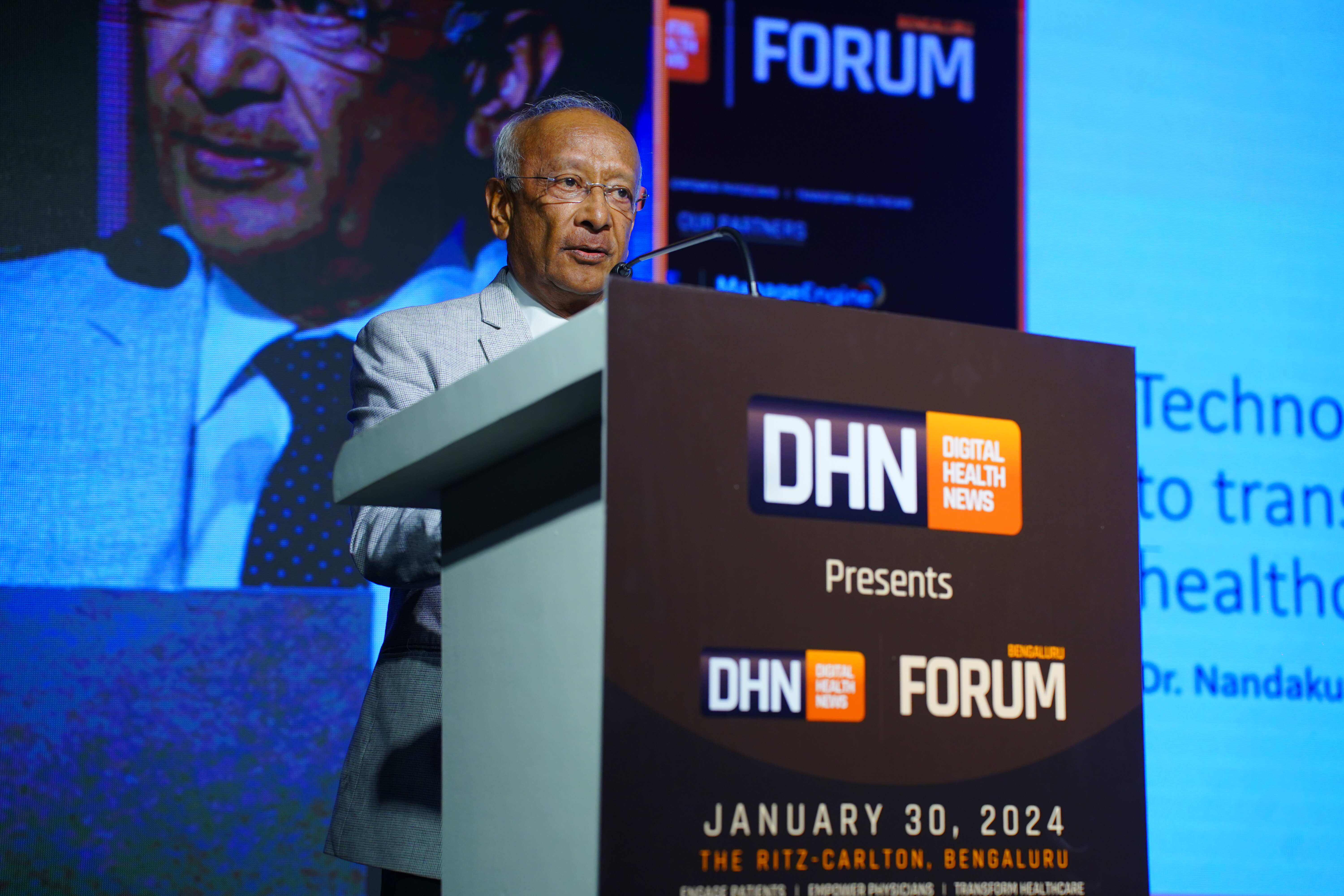
Dr Nandkumar Jairam, chairman of Medica Synergie Hospitals and advisor at Sheares Healthcare India speaks at DHN Forum Bengaluru
During the event, DHN & CHIME India brought their Annual Survey reflecting top digital health trends and outlook for 2024. The Survey provided actionable insights on India's digital healthcare landscape. The survey results were curated from the responses which captured the key data points/insights from 75 industry leaders.
Girish Kulkarni, chairperson of CHIME India, and Vishnu Saxena unveiled the Survey result revealing significant findings.
1. Examine the current state of digital transformation in India's healthcare sector.
2. Determine Position and Trajectory in the rapidly changing healthcare IT environment.
3. Analyze IT Spending and Impact on healthcare practices.
4. Uncover digital technology priorities and key initiatives undertaken by India's top hospital leaders.
Digital Transformation of Healthcare
1. 60.98% believe digital transformation can enhance patient experience and engagement.
2. Lack of initiative to start digital transformation journeys; 0% intend to build or purchase AI or analytics.
3. Interest in implementing and replacing EHR and engaging consulting partners for assistance.
Obstacles and Opportunities
1. 48.78% cite lack of in-house capabilities as the biggest obstacle to the Digital Transformation Initiative.
2. 43.90% focus on improving access to care; 21.95% prioritize enhancing patient experience.
Adoption of Digital Health Technologies
1. 63.68% desire upcoming digital health technology solutions for hospitals' mobile apps.
2. 58.56% feel their organization’s EHR makes it difficult to adopt new technologies.
3. 80.48% intend to adopt AI in the next two years.
IT Budgeting and Spending
1. 51.22% suggest implementing/replacing EHR as the biggest driver.
2. 51.22% believe Healthcare IT budget/spending will remain the same in 2024.
Leadership and Innovation
48.78% attribute primary drivers for Digital Transformation initiatives and adoption of emerging digital technologies to Executive Business Leadership such as CEO, COO, CFO.
The DHN Forum Bengaluru 2024 provided a comprehensive platform for stakeholders to explore digital health trends, strategies, and innovations. The event accentuated the importance of collaboration, leadership, and technology adoption in driving India's digital healthcare transformation.
With insightful discussions and revelations from the DHN & CHIME India Annual Survey, the forum had set the stage for future advancements in India's digital healthcare landscape.
Next in the series of DHN Forum is DHN Forum Mumbai, slated to be held in the last week of May 2024.
